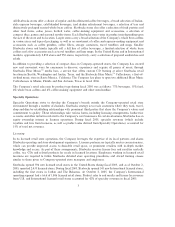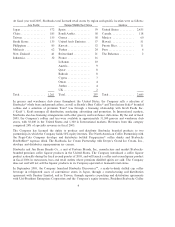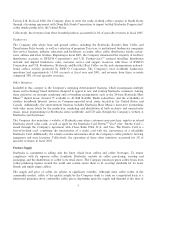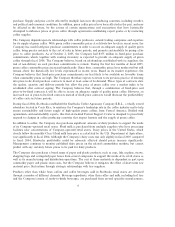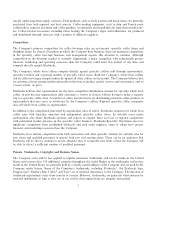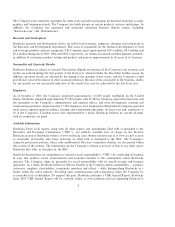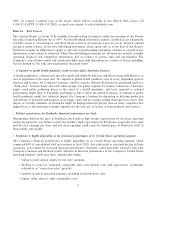Starbucks 2005 Annual Report Download - page 15
Download and view the complete annual report
Please find page 15 of the 2005 Starbucks annual report below. You can navigate through the pages in the report by either clicking on the pages listed below, or by using the keyword search tool below to find specific information within the annual report.‚Starbucks is increasingly dependent on the success of its International operating segment in order to achieve
its growth targets.
The Company's future growth depends increasingly on the growth and operations of its International operating
segment. Some or all of the Company's International market business units (""MBUs''), which Starbucks
generally defines by the countries or regions in which they operate, may not be successful in their operations or
in achieving expected growth. Starbucks may find business partners who do not share its cultural, marketing or
operating philosophies or who are unable to operate the MBU profitably. Some factors that will be critical to
the success of International MBUs are different than those affecting the Company's U.S. stores and licensees.
Tastes naturally vary by region, and consumers in new international markets into which Starbucks and its
licensees expand may not embrace Starbucks products to the same extent as consumers in the Company's
existing markets. Occupancy costs and store operating expenses are also sometimes higher internationally than
in the United States due to higher rents for prime store locations or costs of compliance with country-specific
regulatory requirements. Because many of the Company's International operations are in an early phase of
development, operating expenses as a percentage of related revenues are often higher, compared to
U.S. operations. The Company's International operations are also subject to additional inherent risks of
conducting business abroad, such as:
‚ foreign currency exchange rate fluctuations;
‚ changes or uncertainties in economic, social and political conditions in the Company's markets;
‚ interpretation and application of laws and regulations;
‚ restrictive actions of foreign or United States governmental authorities affecting trade and foreign
investment, including protective measures such as export and customs duties and tariffs and restric-
tions on the level of foreign ownership;
‚ import or other business licensing requirements;
‚ the enforceability of intellectual property and contract rights;
‚ limitations on the repatriation of funds and foreign currency exchange restrictions;
‚ lower levels of consumer spending on a per capita basis than in the United States;
‚ difficulty in staffing, developing and managing foreign operations due to distance, language and
cultural differences; and
‚ local laws that make it more expensive and complex to negotiate with, retain or terminate employees.
‚The China market is important to the Company's long-term growth prospects Ì doing business there and in
other developing countries can be challenging.
Starbucks expects the People's Republic of China to be one of its largest markets outside of the United States.
Any significant or prolonged deterioration in U.S.-China relations might adversely affect the Company's
China business. The Company's growing investments in its China operations will increase the Company's
exposure in this market.
Many of the risks and uncertainties of doing business in China are solely within the control of the Chinese
government. China's government regulates the business conducted by Starbucks through its subsidiaries, joint
ventures and authorized licensees by restricting the scope of the Company's foreign investments within China
and the food and beverage, retail, wholesale and distribution business conducted within China. Although
13


